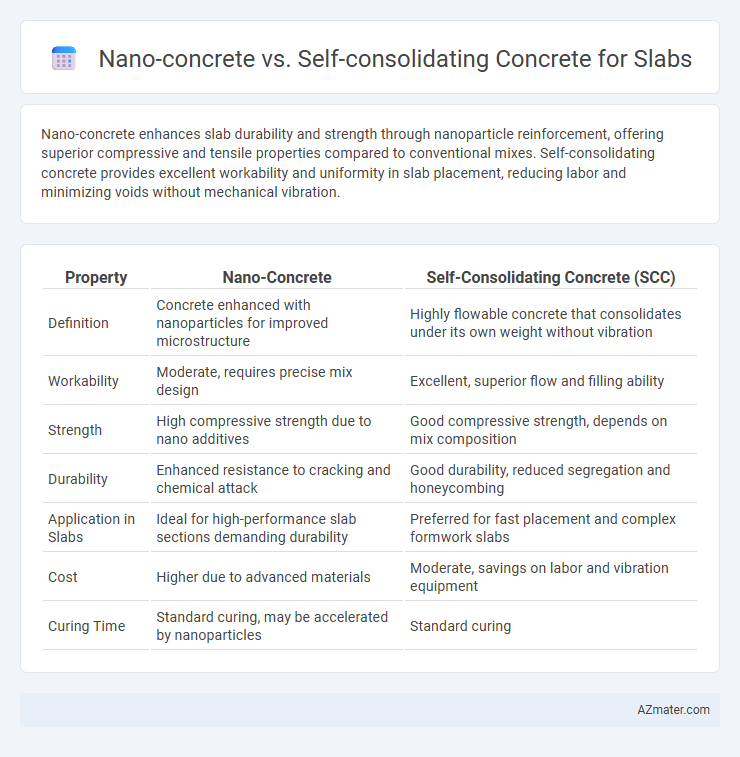Nano-concrete enhances slab durability and strength through nanoparticle reinforcement, offering superior compressive and tensile properties compared to conventional mixes. Self-consolidating concrete provides excellent workability and uniformity in slab placement, reducing labor and minimizing voids without mechanical vibration.
Table of Comparison
| Property | Nano-Concrete | Self-Consolidating Concrete (SCC) |
|---|---|---|
| Definition | Concrete enhanced with nanoparticles for improved microstructure | Highly flowable concrete that consolidates under its own weight without vibration |
| Workability | Moderate, requires precise mix design | Excellent, superior flow and filling ability |
| Strength | High compressive strength due to nano additives | Good compressive strength, depends on mix composition |
| Durability | Enhanced resistance to cracking and chemical attack | Good durability, reduced segregation and honeycombing |
| Application in Slabs | Ideal for high-performance slab sections demanding durability | Preferred for fast placement and complex formwork slabs |
| Cost | Higher due to advanced materials | Moderate, savings on labor and vibration equipment |
| Curing Time | Standard curing, may be accelerated by nanoparticles | Standard curing |
Introduction to Nano-Concrete and Self-Consolidating Concrete
Nano-concrete incorporates nanoparticles such as nano-silica to enhance microstructure, resulting in superior strength, durability, and reduced permeability compared to traditional concrete. Self-consolidating concrete (SCC) is a highly flowable mix designed to fill formwork under its own weight without segregation or need for mechanical vibration, ensuring uniformity and dense packing. Both materials advance slab performance by improving mechanical properties and placement efficiency, with nano-concrete emphasizing material enhancement and SCC focusing on workability and finish quality.
Key Properties of Nano-Concrete
Nano-concrete exhibits enhanced mechanical properties such as higher compressive strength, improved durability, and reduced permeability compared to self-consolidating concrete, making it ideal for slab applications requiring superior performance. The incorporation of nanoparticles like nano-silica refines the microstructure, leading to increased density and resistance to cracking under load. This results in slabs with greater longevity and reduced maintenance costs in demanding environments.
Essential Characteristics of Self-Consolidating Concrete
Self-consolidating concrete (SCC) exhibits exceptional flowability, high deformability, and segregation resistance, making it ideal for slab applications requiring rapid placement without vibration. Unlike nano-concrete, SCC contains carefully proportioned fine aggregates and highly refined admixtures to achieve superior filling ability and uniformity, crucial for complex formworks and dense reinforcement. Its essential characteristics include excellent workability, stability, and cohesiveness, ensuring optimal surface finish and structural integrity in slab construction.
Comparative Strength and Durability Analysis
Nano-concrete exhibits enhanced compressive strength and improved microstructure density due to the inclusion of nanoparticles, leading to superior durability against environmental aggressors compared to self-consolidating concrete (SCC). SCC offers excellent workability and uniform consolidation without vibration, yet its strength gains are generally lower than nano-concrete, especially under high loading conditions. Durability assessments indicate nano-concrete's greater resistance to chloride penetration, freeze-thaw cycles, and abrasion, making it more suitable for slabs exposed to harsh environments.
Workability and Placement Techniques
Nano-concrete enhances slab workability through the incorporation of nanoparticles, which refine the microstructure and improve flowability without increasing water content, leading to easier placement and reduced segregation risk. Self-consolidating concrete (SCC) offers superior workability by eliminating the need for mechanical vibration, relying on high flowability and stability to fill formwork uniformly, especially beneficial for complex slab geometries. Placement techniques for nano-concrete demand precise mixing to ensure nanoparticle dispersion, while SCC requires careful monitoring of viscosity and stability to maintain its self-leveling properties during slab casting.
Sustainability and Environmental Impact
Nano-concrete incorporates nanoparticles to enhance durability and reduce material usage, thus lowering the carbon footprint associated with cement production compared to traditional mixes. Self-consolidating concrete (SCC) minimizes energy consumption during placement by eliminating the need for mechanical vibration, promoting faster construction cycles and reducing emissions on-site. Both materials contribute to sustainability, but nano-concrete offers greater potential for long-term environmental benefits through improved strength and reduced maintenance requirements.
Cost Implications for Slab Construction
Nano-concrete incorporates nanoparticles to enhance strength and durability, often resulting in higher initial material costs compared to self-consolidating concrete (SCC), which is designed for improved flow and reduced labor requirements. SCC reduces the need for vibration and extensive labor, lowering overall construction time and associated costs for slab construction. While nano-concrete may increase upfront expenses, its long-term benefits in durability can reduce maintenance costs, whereas SCC offers immediate cost savings by accelerating the construction process.
Performance in Reinforced Slab Structures
Nano-concrete enhances reinforced slab structures with superior compressive strength and durability due to its nano-sized particles improving the microstructure and reducing porosity. Self-consolidating concrete (SCC) offers exceptional flowability and uniform distribution around reinforcement, minimizing voids and eliminating the need for vibration, which improves bonding and structural integrity. While nano-concrete excels in mechanical performance, SCC optimizes placement efficiency and consistency in reinforced slabs.
Maintenance and Long-term Service Life
Nano-concrete enhances slab durability through improved microstructure, reducing permeability and mitigating crack formation, which lowers maintenance frequency. Self-consolidating concrete provides excellent workability and uniform compaction, yet may require careful mix design to prevent segregation and ensure long-term stability. Over extended service life, nano-concrete's superior resistance to environmental stressors translates to fewer repairs and sustained structural integrity compared to standard self-consolidating concrete slabs.
Conclusion: Choosing the Optimal Concrete for Slabs
Nano-concrete offers enhanced durability and superior crack resistance due to its nano-sized particles that improve microstructure, making it ideal for high-performance slabs requiring long-term strength. Self-consolidating concrete (SCC) provides excellent workability and uniform results with reduced labor, making it a practical choice for complex slab geometries and fast construction schedules. Selecting the optimal concrete depends on project-specific demands for durability, ease of placement, and cost-effectiveness, with nano-concrete suited for longevity and SCC preferred for efficient, high-quality slab finishes.

Infographic: Nano-concrete vs Self-consolidating concrete for Slab
 azmater.com
azmater.com